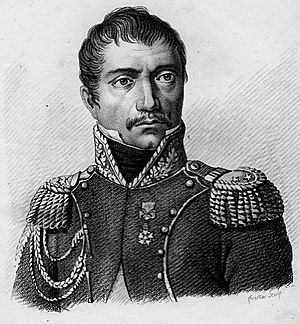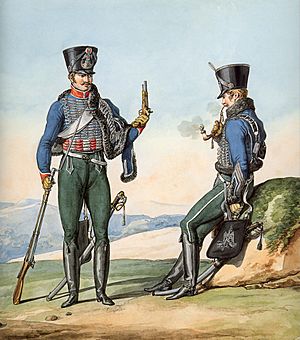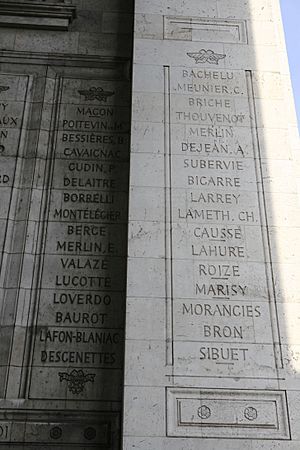Antoine François Eugène Merlin facts for kids
Quick facts for kids
Antoine François Eugène Merlin
|
|
|---|---|
 |
|
| Born | December 27, 1778 Douai |
| Died | August 31, 1854 (aged 75) Eaubonne |
| Allegiance | |
| Service/ |
Cavalry |
| Years of service | 1793–1848 |
| Battles/wars | French Revolutionary Wars Napoleonic Wars |
| Awards | Grand Officer of the Legion of Honour Knight of the Order of St Louis |
| Other work | Member of the Chamber of Deputies Peer of France |
Antoine François Eugène Merlin (born December 27, 1778, died August 31, 1854) was a brave French soldier. He became a general during the French Revolution and the Napoleonic Wars. He fought in many important battles across Europe, including the Peninsular War and the famous Battle of Waterloo. Later, he became a politician and helped lead France.
Contents
Becoming a Soldier
Antoine François Eugène Merlin was born in Douai, France. His father was a lawyer and politician. Antoine started his military career very young, at just 14 years old, in 1793. He worked with General Cambray during a conflict called the war in the Vendée.
In 1795, he joined a cavalry unit as a Second Lieutenant. Soon after, he became an aide-de-camp, which is like a personal assistant, to General Songis. For the next two years, he served in the French Army of the North.
Adventures in Egypt
In 1798, Merlin joined the French invasion of Egypt. He was an aide-de-camp to General Bonaparte himself! He fought in important battles like the battle of the Pyramids. He also took part in the sieges of Jaffa and Acre. He was even promoted to Lieutenant during this time. He returned to France with Napoleon in 1799.
After returning to France, Merlin continued to rise through the ranks. He became a Captain in 1800. He served in the Army of Italy and fought at the Battle of Marengo. He was promoted again to Chef d'escadron (a cavalry major) in 1801. He was honored with the title of Knight of the Legion of Honour in 1804.
Fighting for the Empire
In 1805, Merlin's regiment joined the Grande Armée, Napoleon's main army. He fought in major battles like Austerlitz, Jena, and Friedland. He showed great courage during the capture of Lübeck. Because of his bravery, he was promoted to Major in 1807.
In 1810, Merlin became a Colonel, leading the 1st Hussars. This regiment was fighting in the Peninsular War in Spain. He was very brave at the Battle of Sabugal. There, he helped defeat a British regiment and got back an artillery piece they had captured. For this, he was made an Officer of the Legion of Honour.
The next year, Merlin fought at the Battle of Salamanca. His actions helped protect the French army as they retreated. In 1813, he was promoted to Général de Brigade (Brigadier General). He was called back to the Grande Armée in Germany.
Battles in Germany
During the German Campaign of 1813, Merlin led a cavalry brigade. He fought in the huge Battle of Leipzig and the Battle of Hanau. Napoleon himself praised Merlin for his actions. Merlin then helped defend the city of Mainz.
After Napoleon gave up his power, Merlin was made inactive in the military. However, he was honored by King Louis XVIII as a Knight of the Order of St Louis.
When Napoleon briefly returned to power during the Hundred Days, Merlin supported him. He took control of the fort of Vincennes. He then helped organize and lead a new cavalry regiment for the Imperial Guard.
During the Waterloo campaign, Merlin commanded a cavalry brigade. This unit fought bravely at the Battle of Ligny and helped defend Plancenoit during the famous battle of Waterloo.
Life After the Wars
After Napoleon's final defeat, Merlin had to leave France for a short time with his father. He was able to return to France in 1818. He lived a quiet life for a while.
In 1830, a new government came to power in France, and Merlin returned to duty. He was made a Commander of the Legion of Honour. He led a cavalry brigade during the Ten Days' Campaign and was present at the Siege of Antwerp. He was promoted to Lieutenant General in 1832. He held several important military positions after that.
Merlin also became a politician. He was elected to represent Avesnes in 1834. He supported the new government, known as the July Monarchy. He received even more honors, becoming a Grand Officer of the Legion of Honor in 1837. When his father passed away, he became a Count. In 1839, he became a Peer of France, which was a high political position. He finally retired from the military in 1848.
General Merlin passed away in Eaubonne on August 31, 1854. He was buried in the cemetery there. His name is proudly carved on the south side of the Arc de Triomphe in Paris, honoring his service to France.
Family
Merlin married Louise Gohier in 1806. She was the only child of Louis-Jérôme Gohier. Merlin and Louise did not have any children.
See also
 In Spanish: Antoine François Eugène Merlin para niños
In Spanish: Antoine François Eugène Merlin para niños
 | Jackie Robinson |
 | Jack Johnson |
 | Althea Gibson |
 | Arthur Ashe |
 | Muhammad Ali |



